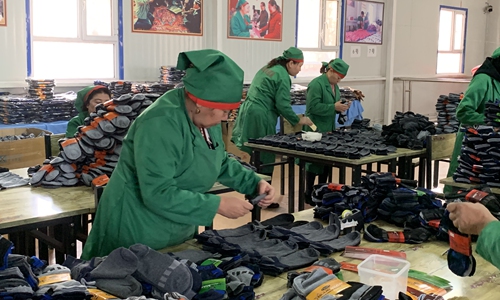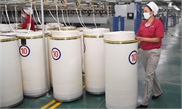Xinjiang companies’ plan to resume production amid coronavirus hindered by labor shortage, delayed logistics
Xinjiang companies gradually resume production on a large scale

A local employee makes socks at a factory in Aksu Prefecture, Northwest China's Xinjiang Uygur Autonomous Region, in November. Photo: Li Xuanmin/GT
Local companies in Northwest China's Xinjiang Uygur Autonomous Region are gradually resuming work on a large scale as the region has not been severely hit by the onslaught of the coronavirus, yet some local businesses still face daunting challenges including labor shortage issues, delayed logistics services and difficulties procuring raw materials.
In southern Xinjiang's Aksu Prefecture, 90 out of 241 major companies had resumed production by Monday amid the coronavirus outbreak, local officials told the Global Times, while noting that local Xinjiang governments attach equal importance to epidemic prevention and stabilizing economic development.
The Global Times learned that production resumed earlier in sectors concerning the livelihood of local residents, such as the manufacturing of edible oil and flour. Some maintained production during the Spring Festival holidays to ensure supply, after demand shot up due to the coronavirus outbreak.
While the region is on track to resuming normal economic activities, local manufacturers told the Global Times that they may start later, most in early March, due to a lack of skilled workers, most of whom come from outside Xinjiang and need to be quarantined for 14 days before coming to work posts.
The transportation network also poses a hurdle.
Li Judong, general manager of Aksu Hengtong Juice Co which produces concentrated juice, told the Global Times on Tuesday that the firm has "partially" resumed operation as it needs to ship apple juice stocks to Russia on time.
"Production has not resumed as we cannot source materials due to delayed courier services. But luckily, we have bulk inventories that could sustain on-time delivery to foreign clients in Russia and European countries for more than two months," Li said.
Some industry insiders worried that the postponed resumption of work in labor-intensive industries could weigh on local employment market in southern Xinjiang, where ethnic Uygur residents account for about 80 percent of the local population.
Aware of the fallout, local officials said they have come up with "question lists" each day, and have been addressing enterprises' concerns one by one.
"On the one hand, we require companies to strengthen protective measures to prevent potential infections. On the other hand, more supportive measures are in the pipeline, such as mobilizing more local labor force to back up affected enterprises," Chen Xiaozeng, director of Aksu's publicity department, said in an interview.




